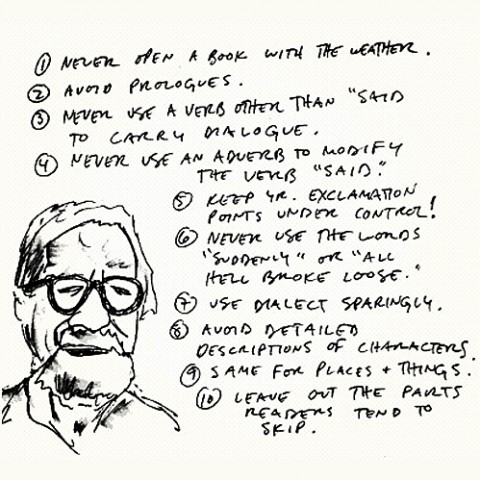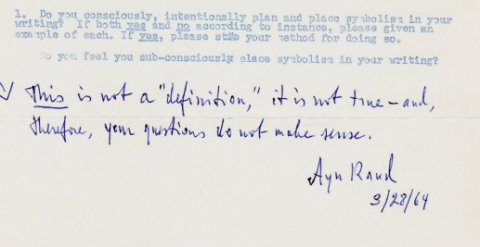Here’s one way to become a better writer. Listen to the advice of writers who earn their daily bread with their pens. During the past week, lists of writing commandments by Henry Miller, Elmore Leonard (above) and William Safire have buzzed around Twitter. (Find our Twitter stream here.) So we decided to collect them and add tips from a few other veterans — namely, George Orwell, Margaret Atwood, and Neil Gaiman. Here we go:
Henry Miller (from Henry Miller on Writing)
1. Work on one thing at a time until finished.
2. Start no more new books, add no more new material to “Black Spring.”
3. Don’t be nervous. Work calmly, joyously, recklessly on whatever is in hand.
4. Work according to the program and not according to mood. Stop at the appointed time!
5. When you can’t create you can work.
6. Cement a little every day, rather than add new fertilizers.
7. Keep human! See people; go places, drink if you feel like it.
8. Don’t be a draught-horse! Work with pleasure only.
9. Discard the Program when you feel like it–but go back to it the next day. Concentrate. Narrow down. Exclude.
10. Forget the books you want to write. Think only of the book you are writing.
11. Write first and always. Painting, music, friends, cinema, all these come afterwards.
George Orwell (From Why I Write)
1. Never use a metaphor, simile, or other figure of speech which you are used to seeing in print.
2. Never use a long word where a short one will do.
3. If it is possible to cut a word out, always cut it out.
4. Never use the passive where you can use the active.
5. Never use a foreign phrase, a scientific word, or a jargon word if you can think of an everyday English equivalent.
6. Break any of these rules sooner than say anything outright barbarous.
Margaret Atwood (originally appeared in The Guardian)
1. Take a pencil to write with on aeroplanes. Pens leak. But if the pencil breaks, you can’t sharpen it on the plane, because you can’t take knives with you. Therefore: take two pencils.
2. If both pencils break, you can do a rough sharpening job with a nail file of the metal or glass type.
3. Take something to write on. Paper is good. In a pinch, pieces of wood or your arm will do.
4. If you’re using a computer, always safeguard new text with a memory stick.
5. Do back exercises. Pain is distracting.
6. Hold the reader’s attention. (This is likely to work better if you can hold your own.) But you don’t know who the reader is, so it’s like shooting fish with a slingshot in the dark. What fascinates A will bore the pants off B.
7. You most likely need a thesaurus, a rudimentary grammar book, and a grip on reality. This latter means: there’s no free lunch. Writing is work. It’s also gambling. You don’t get a pension plan. Other people can help you a bit, but essentially you’re on your own. Nobody is making you do this: you chose it, so don’t whine.
8. You can never read your own book with the innocent anticipation that comes with that first delicious page of a new book, because you wrote the thing. You’ve been backstage. You’ve seen how the rabbits were smuggled into the hat. Therefore ask a reading friend or two to look at it before you give it to anyone in the publishing business. This friend should not be someone with whom you have a romantic relationship, unless you want to break up.
9. Don’t sit down in the middle of the woods. If you’re lost in the plot or blocked, retrace your steps to where you went wrong. Then take the other road. And/or change the person. Change the tense. Change the opening page.
10. Prayer might work. Or reading something else. Or a constant visualisation of the holy grail that is the finished, published version of your resplendent book.
Neil Gaiman (read his free short stories here)
1. Write.
2. Put one word after another. Find the right word, put it down.
3. Finish what you’re writing. Whatever you have to do to finish it, finish it.
4. Put it aside. Read it pretending you’ve never read it before. Show it to friends whose opinion you respect and who like the kind of thing that this is.
5. Remember: when people tell you something’s wrong or doesn’t work for them, they are almost always right. When they tell you exactly what they think is wrong and how to fix it, they are almost always wrong.
6. Fix it. Remember that, sooner or later, before it ever reaches perfection, you will have to let it go and move on and start to write the next thing. Perfection is like chasing the horizon. Keep moving.
7. Laugh at your own jokes.
8. The main rule of writing is that if you do it with enough assurance and confidence, you’re allowed to do whatever you like. (That may be a rule for life as well as for writing. But it’s definitely true for writing.) So write your story as it needs to be written. Write it honestly, and tell it as best you can. I’m not sure that there are any other rules. Not ones that matter.
William Safire (the author of the New York Times Magazine column “On Language”)
1. Remember to never split an infinitive.
2. The passive voice should never be used.
3. Do not put statements in the negative form.
4. Verbs have to agree with their subjects.
5. Proofread carefully to see if you words out.
6. If you reread your work, you can find on rereading a great deal of repetition can be by rereading and editing.
7. A writer must not shift your point of view.
8. And don’t start a sentence with a conjunction. (Remember, too, a preposition is a terrible word to end a sentence with.)
9. Don’t overuse exclamation marks!!
10. Place pronouns as close as possible, especially in long sentences, as of 10 or more words, to their antecedents.
11. Writing carefully, dangling participles must be avoided.
12. If any word is improper at the end of a sentence, a linking verb is.
13. Take the bull by the hand and avoid mixing metaphors.
14. Avoid trendy locutions that sound flaky.
15. Everyone should be careful to use a singular pronoun with singular nouns in their writing.
16. Always pick on the correct idiom.
17. The adverb always follows the verb.
18. Last but not least, avoid cliches like the plague; seek viable alternatives.
Related Content:
Ray Bradbury Gives 12 Pieces of Writing Advice to Young Authors (2001)
John Steinbeck’s Six Tips for the Aspiring Writer and His Nobel Prize Speech
Elmore Leonard’s Ultimate Guide for Would-Be Writers





